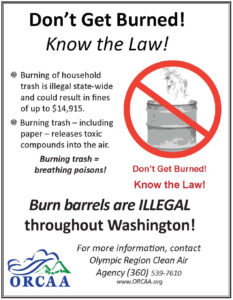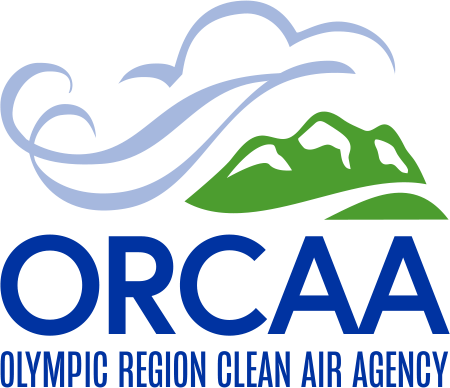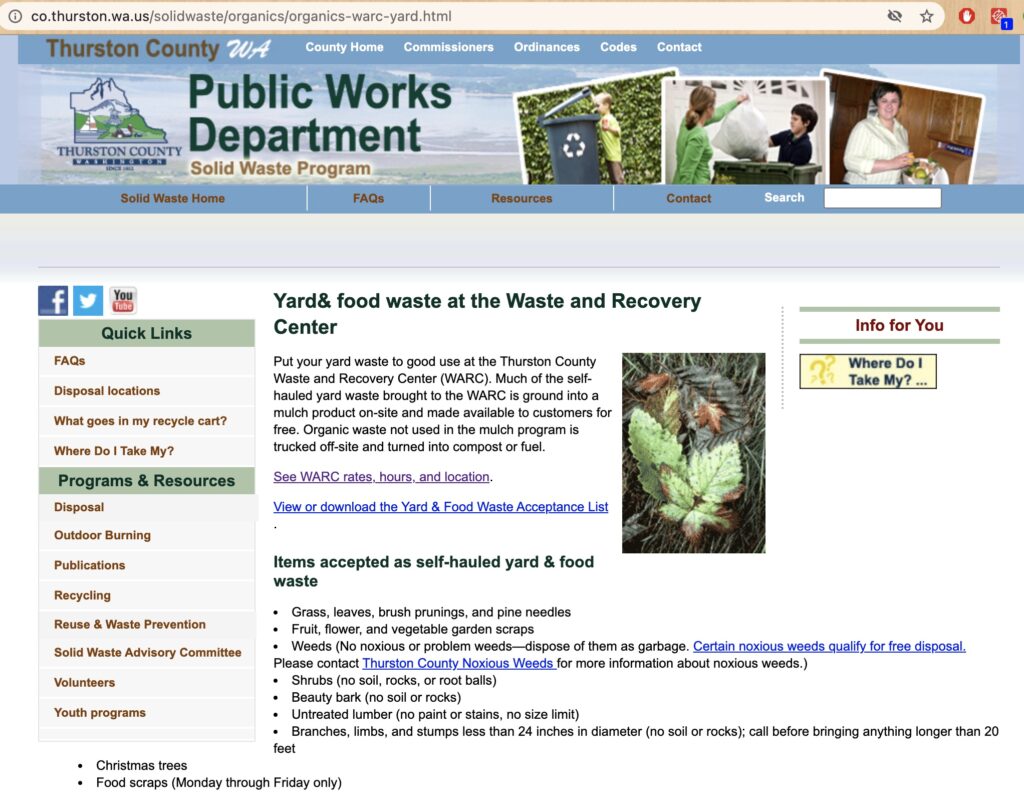
Our new home came with a big lot, and seven old, neglected fruit trees. Apples, pears, and cherries.
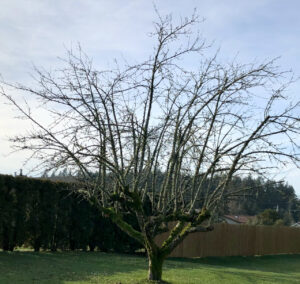 The upside to having this old orchard is obvious: Great, fresh fruit. The downside, though, is waste. Those old unruly trees required a lot of pruning to return them to good health and productivity.
The upside to having this old orchard is obvious: Great, fresh fruit. The downside, though, is waste. Those old unruly trees required a lot of pruning to return them to good health and productivity.
A long weekend in January spent thinning, pruning, and generally cleaning up the orchard produced a huge pile of woody debris. The question then became, “what to do with it?”
Burn, chip, or haul?
After short consideration, we opted not to rent a chipper to break down the debris on our own. The cost*, time, and mess seemed more trouble than we wanted to deal with this time, though we’ll consider it for future projects.
* Small chippers (4” diameter limb capacity) rent for $69 for 4 hours from Home Depot (Lacey), and $150/day at Sunbelt Rentals.
Instead, we packed the debris into a 5-foot x 10-foot utility trail, stacked about 5-feet tall, and tarped it to keep it secure in transit. A short drive to the Thurston County Waste and Recovery Center (WARC) got us to the compost section, where we quickly unloaded and headed back through the WARC scales. That big pile of woody debris weighed in at nearly 600 pounds but cost just $12 to dispose. And on the way out of the facility, we stopped at WARC’s mulch pile and loaded a couple cubic yards of free mulch to use around our yard and orchard!
We hauled away our yard waste, but was that the best option?
Being outside any city or Urban Growth Area (UGA) boundaries and having a big enough lot we could meet fire-safety requirements, we had the legal option to acquire a Thurston County Residential Burn permit and dispose of the debris through fire.
But did that make sense? Burning isn’t a simple matter. First, we’d need to store the pile of green limbs and debris long enough to let it dry out enough to not be a massive smoke-producer (which can result in fines!). Burning also has legal responsibilities. It requires getting a permit – admittedly an easy process through ORCAA’s website – and adhering to all the terms of that permit. Those include (items in red are the specific language from the permit terms):
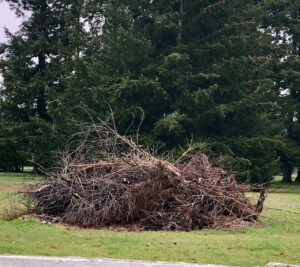
- Checking weather to make sure conditions are appropriate for a fire.
- When winds exceed 5 miles per hour (mph), fires shall not be ignited. If winds exceed 10 mph, ALL fires must be extinguished.
- Establishing a burn site a safe distance from any structure – including fences and sheds – and standing timber.
- The burn pile must be at least 50 feet from any structure or standing timber, 10 feet from property lines, and at least 500 feet from forest/land clearing debris piles.
- Setting up safety equipment and procedures.
- A shovel and water-charged hose shall be on-site and immediately available. A minimum of two 5-gallon buckets FULL of water may substitute for a water-charged hose.
- Setting aside the time to attend the fire from the first ignition to the last puff of smoke.
- Fires must be attended until completely out meaning, NO FLAME, NO SMOKE REMAINING.
- Burning may occur only during daylight hours.
- Dealing with the legal responsibility of your smoke and fire.
- Fires must be immediately extinguished if it causes a nuisance to others or poses a threat to people or property. Failure to comply could result in fines.
- The applicant is responsible for ensuring compliance with all local, state, and federal laws while burning, pursuant to this permit.
- PENALTIES may be assessed for violations of these permit rules as well as for violations of local, state, and federal regulations.
- In addition, the fire district may recover costs incurred during the response, control, or suppression of an unlawful or out-of-control fire. The property owner or person doing the burning assumes responsibility for any damage, by emission or flame, to any structure, utility line or pole, tree or shrub, fence, road or right-of-way, or other public or private edifices. The applicant accepts responsibility for any claimed adverse effects on the health or wellbeing of any person or persons in the path of the fire emissions. Burning garbage or any prohibited materials may result in substantial fines from ORCAA (maximum allowable fine: $14,915).
The trip to WARC cost $12, took roughly 60 minutes round-trip (including unloading the debris and loading the free mulch), and resulted in 2 yards of free mulch to help protect and nourish our yard and orchard. If we had burned, it would have taken at least an entire extra day and left us open to complaints, fines, and legal obligations.
$12 is a cheap price to pay for a free day and peace of mind.
